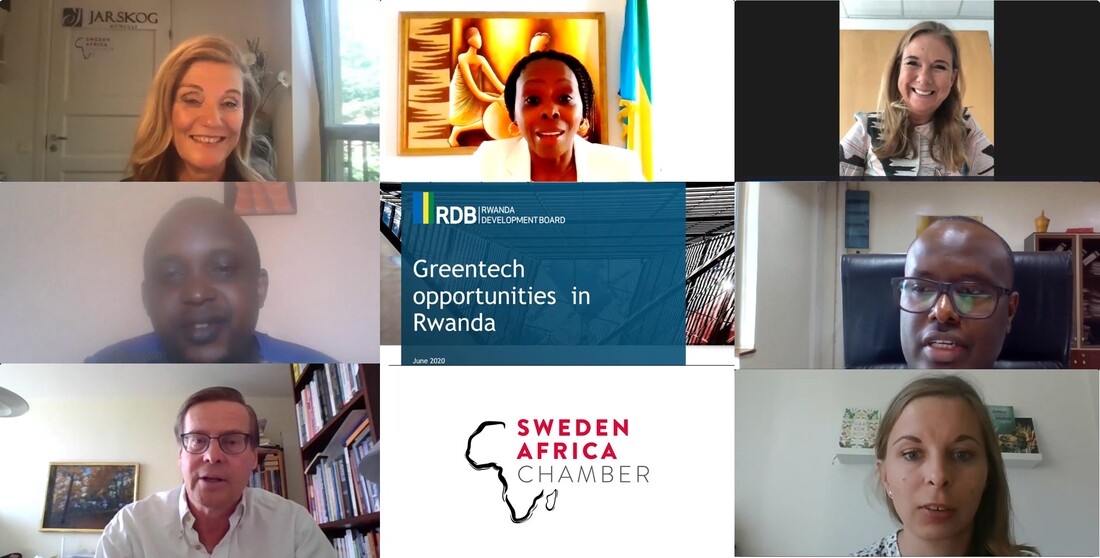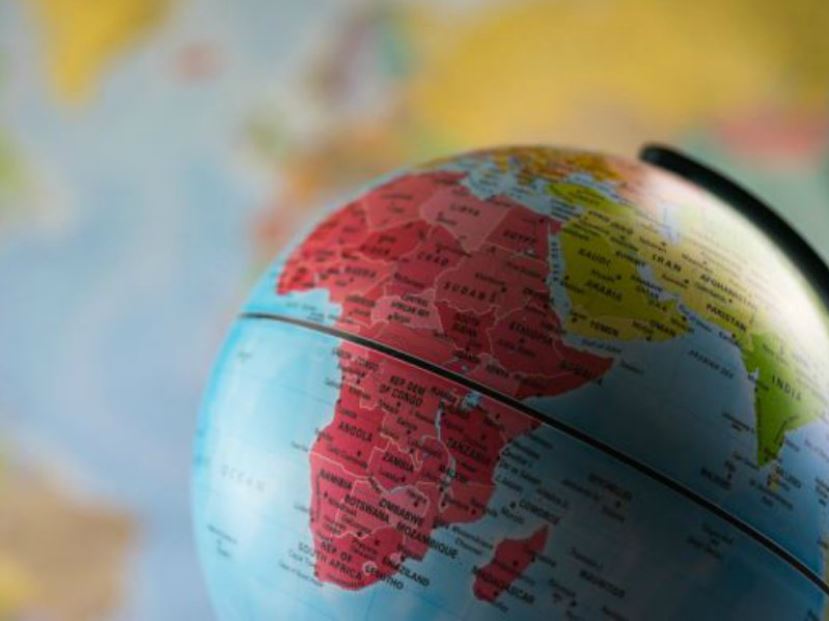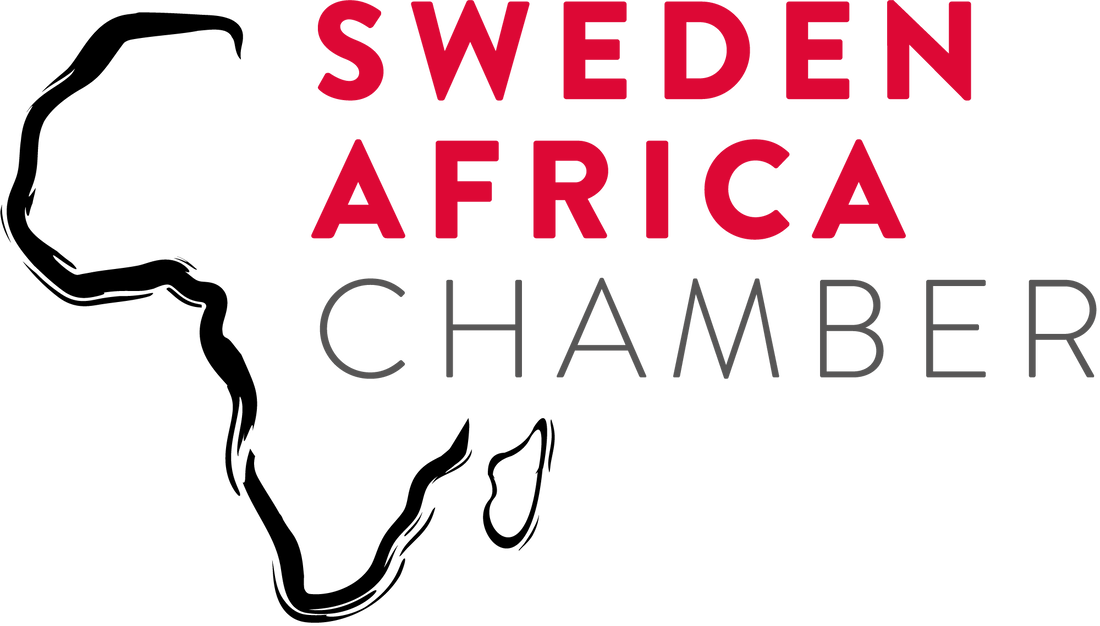|
Sweden Africa Chamber arranged a business mission to Rwanda in 2019, and in June this year some of the learnings and experiences were followed up with a webinar on business opportunities in Rwanda. The economy of fast-growing Rwanda is expected to take off rapidly once the corona pandemic has receded - We had a very successful business mission, and there were several results that came after. Soon after several deals were signed, and everything looked perfect. Then as you know what happened is that in February and March borders were closed and the whole world went on lockdown, except for Sweden, said moderator Åsa Jarskog, president of Sweden Africa Chamber, at the webinar.
Jarskog also pointed to the frustration of the chamber’s members when they can't be in touch with their business partners the way they used to be. She however added that the Sweden Africa Chamber is trying to bridge this temporary gap, so that everybody can stay in touch with partners in Africa. At the same time several countries in Africa have reacted swiftly to the threat of the virus. This goes certainly for Rwanda, with its well-structured administration and government strategies. - When the first case was registered here the government was well prepared and acted very fast. The government also had a clear strategy to contain the virus and prevent spreading, so there was a total lockdown for six weeks, said Anne Höglund, acting head of mission of Sweden to Kigali, Rwanda. Thanks to this strategy only 113 cases of corona had been registered in Rwanda up until the time of the webinar. - But even if Rwanda hasn't been hit very hard by the virus itself, the economy has suffered immensely. So to maintain financial stability, Rwanda has received loans from IMF and the World Bank. The government has also launched a response strategy to save the economy, and is working very closely with the international community to finance this. But of course it is very important with private investments and continued business relations. Höglund concluded by stating how the situation arguably has changed with the virus, it is important to remember that what was attractive with Rwanda and very positive before covid-19 has not changed. - So Rwanda is a safe country with high ambitions and a very clear strategy for its development. And Rwanda wants to engage with the world and continue to develop its country. Digitalisation, sustainable solutions and innovation are more important than ever. After Ms. Höglund Philip Lucky, Senior Investment Promotion Officer at the Rwanda Development Board, held a presentation on the economic environment in the country. For instance, GDP has grown with almost 8 percent per annum in ten years, reaching a GDP per capita of USD 787 (or 3,8 times the GDP in 2002). - After the genocide in 1994, the socioeconomic fabric in this country was completely decimated. Today we are the second fastest growing economy in Africa, and the most improved nation in human development in the world. A number of factors have worked together to create today's successful Rwanda, including a low debt ratio, a stable currency, far-reaching efforts to facilitate business, impressive government transparency and a high IT readiness. - We have passed numerous reforms to make Rwanda more attractive for foreign direct investments. For example, the World Bank Ease of Doing Business Report has ranked Rwanda as the second easiest place to do business in Africa, said Philip Lucky. In addition Rwanda has zero percent import duty, no restrictions on foreign ownership and free repatriation of local investment income, capital and assets. - And our climate change policy that was adopted in June 2019 has among the key objectives to promote a green economic transformation, explained Lucky. In terms of opportunities for Swedish investors specifically, Philip Lucky suggests several interesting areas, such as e-mobility, off-grid electricity, forest management and wood processing, and sustainable packaging. Within e-mobility, companies such as Volkswagen, Ampersand and SAFI has chosen Rwanda for their pilot projects, whereas for instance Ignite, Bboxx and Mobisol are very active in the vibrant solar home energy market in Rwanda. After this, Mr. Theoneste Ntagengerwa with the Private Sector Federation of Rwanda, held a presentation on the opportunities and challenges for doing business in Rwanda. - One of the biggest challenges we are currently facing relates to transport and logistics, since most of our exports to Europe and other areas used to go with commercial airlines, but they are not operating now, told Mr. Ntagengerwa. To address some of the difficulties now faced - including the transport and logistics hurdles - the Private Sector Federation of Rwanda has engaged in a number of deep-dive research initiatives in different sectors. Also participating in the webinar was the Ambassador of Rwanda to Sweden, Christine Nkulikiyinka, who explained how Rwanda currently works together with a number of other countries in the region to counteract the corona threat. - And when you look at the support we get from the institutions it is a strong sign that we are reliable as a country, Ms. Nkulikiyinka added with reference to Ms. Anne Höglund's introductory presentation. Comments are closed.
|
Archives
December 2023
|


 RSS Feed
RSS Feed

